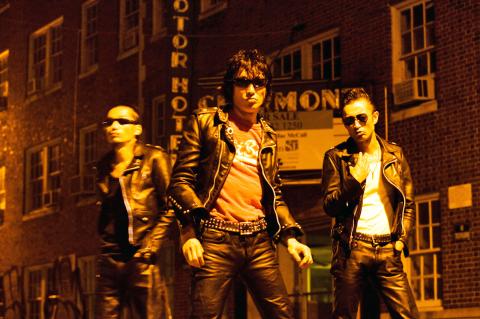Watch out this weekend ’cause a big, bad wolf will be rocking at the door. For the past 20 years, punk rockabilly legend Guitar Wolf — a Japanese three-piece outfit composed of Guitar Wolf, Bass Wolf, and Drum Wolf — have blasted eardrums and broken sound barriers. The group has toured with the Cramps and played with the Jon Spencer Blues Explosion, and made audiences howl at events like Fuji Rock, Rock in Japan and SXSW.
After a tour of Japan in September, the US last month, and a recent Matador Records showcase with Pavement and Sonic Youth, the band is playing in Kaohsiung tonight and Taipei tomorrow.
Matador Records said that when the band sent in the master for its album Jet Generation, the sound engineer said the sound “levels exceeded the theoretical maximum possible on compact disk,” and that it was “the loudest CD in history.”

Photo courtesy of Guitar Wolf
Guitar Wolf’s sound is heavily influenced by the Ramones, with elements of the Boredoms’ future-wave noise punk and what the band calls “Jet Rock,” a tip of the hat to Joan Jett, a long-term inspiration and hero for Seiji (aka Guitar Wolf). He was 18 years old when he first saw her play and was taken “prisoner” by her “leopard eyes,” he said in a recent e-mail interview.
The group’s most popular albums are Planet of the Wolves and Jet Generation. The most soulful is Dead Rock, composed after the original Bass Wolf, Billy, died of a heart attack in 2005 aged 38. The tragedy tempered the band members’ hard-drinking lifestyle, though they still keep a beer machine in their office.
The band’s look and attitude are as important to Guitar Wolf as the music. Seiji’s fashion revolves around a black-on-black theme — omnipresent wraparound shades (one interviewer commented that in 13 years of knowing Seiji he’d only seen his eyes once) and a collection of leather jackets that include one signed by the Ramones, one signed by Joan Jett, and a black-and-white jacket similar to the one Johnny Thunders wore.
Interviewing such a band presents it’s own difficulties.
Asked how he decided to make rock ’n’ roll his life, Seiji wrote: “Human is not to become a person who can become it. It becomes the one wanting to become it.”
Seiji went on to explain that rock ’n’ roll was the best way for him to “keep cool” and to be “popular among lovely girls.”
But what can fans expect from the show?
“If you are bitten by us, you are [in] serious [trouble],” Seiji wrote. “You might [catch] the sickness of intense rock and roll. Give an antirabies serum for the case.”
“Our new album is coming soon,” Seiji wrote. “Anyway, we can’t wait to eat you.”

Dissident artist Ai Weiwei’s (艾未未) famous return to the People’s Republic of China (PRC) has been overshadowed by the astonishing news of the latest arrests of senior military figures for “corruption,” but it is an interesting piece of news in its own right, though more for what Ai does not understand than for what he does. Ai simply lacks the reflective understanding that the loneliness and isolation he imagines are “European” are simply the joys of life as an expat. That goes both ways: “I love Taiwan!” say many still wet-behind-the-ears expats here, not realizing what they love is being an

Every now and then, even hardcore hikers like to sleep in, leave the heavy gear at home and just enjoy a relaxed half-day stroll in the mountains: no cold, no steep uphills, no pressure to walk a certain distance in a day. In the winter, the mild climate and lower elevations of the forests in Taiwan’s far south offer a number of easy escapes like this. A prime example is the river above Mudan Reservoir (牡丹水庫): with shallow water, gentle current, abundant wildlife and a complete lack of tourists, this walk is accessible to nearly everyone but still feels quite remote.

Google unveiled an artificial intelligence tool Wednesday that its scientists said would help unravel the mysteries of the human genome — and could one day lead to new treatments for diseases. The deep learning model AlphaGenome was hailed by outside researchers as a “breakthrough” that would let scientists study and even simulate the roots of difficult-to-treat genetic diseases. While the first complete map of the human genome in 2003 “gave us the book of life, reading it remained a challenge,” Pushmeet Kohli, vice president of research at Google DeepMind, told journalists. “We have the text,” he said, which is a sequence of

It’s a bold filmmaking choice to have a countdown clock on the screen for most of your movie. In the best-case scenario for a movie like Mercy, in which a Los Angeles detective has to prove his innocence to an artificial intelligence judge within said time limit, it heightens the tension. Who hasn’t gotten sweaty palms in, say, a Mission: Impossible movie when the bomb is ticking down and Tom Cruise still hasn’t cleared the building? Why not just extend it for the duration? Perhaps in a better movie it might have worked. Sadly in Mercy, it’s an ever-present reminder of just